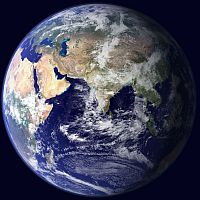- Home
- Science
- Research Groups
- Research Topics
- Annual Report
- Education
- Agenda
- Public & Media

- Contact Us
de Géophysique (Bât. B5c)
Quartier Agora
Allée du 6 août, 19C
B-4000 Liège 1 (Sart-Tilman)
Belgique
Tel.: 04.366.9779
Fax: 04.366.9729
Research Topics
Climate

The Earth's climate is the result of complex interactions that involve the amount of incoming solar radiation, atmospheric composition, land cover, water and heat transport, and biogeochemical cycles. Climatic fluctuations naturally occur over long time scales. Examples include the glacial-interglacial climate cycles that have been repeating regularly for several million years. Industrialization has disrupted the natural cycle by speeding up, among other things, transfers of fossil fuels to the atmosphere. It is now established that human activity has the potential to significantly and permanently alter the Earth's climate.
Several research groups within our department are involved in the reconstruction of past climates, the prediction of future climate, and in the observation of the current evolution. Research efforts in this context essential deal with the assessment of the impacts of climate change on terrestrial ecosystems and the study of climate-carbon cycle feedbacks.
Numerical models are indispensable tools in research focussing on the climate and the biogeochemical evolution of the Earth. Members of LPAP and UMCCB develop models of biogeochemical cycles, such as the dynamic vegetation model CARAIB, the ecosystem model ASPECTS, the ocean carbon cycle models LOCH and MBM, the sediment model MEDUSA and a global model of geochemical cycles. They also use tools developed in collaboration with other institutions, such as the Earth system model Planet Simulator or LOVECLIM.
Observational data are essential to estimate the importance of current climate changes. GIRPAS has analyzed the chemical composition of the atmosphere for two decades, allowing the monitoring of fifteen atmospheric constituents that affect the radiative balance of the Earth system. UMCCB collaborators assess the exchange of carbon dioxide (CO2) on the basis of local measurements from a monitoring station in a forest to better understand the interactions between vegetation and atmospheric CO2 content.



 Version française
Version française